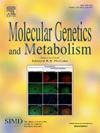Enzymatic synthesis of 3-hydroxyacyl-CoAs of branched-chain amino acid catabolism
IF 3.5
2区 生物学
Q2 ENDOCRINOLOGY & METABOLISM
引用次数: 0
Abstract
Acyl-coenzyme A (CoA) thioesters occupy key positions in normal metabolism and are directly related to many inborn errors of metabolism. The degradation pathways of the branched-chain amino acids (BCAAs) are rich in acyl-CoA intermediates, many of which give rise to diagnostically important organic acids and acylcarnitines. Because several such acyl-CoAs are not routinely commercially available, they cannot be identified and quantified in biological samples. This leaves a gap in the characterization of BCAA-related inborn errors of metabolism. We attempted the enzymatic synthesis of BCAA-related 3-hydroxyacyl-CoAs, starting with the corresponding 2,3-enoyl free acids. First the 2,3-enoyl free acid is linked to CoA by purified recombinant glutaconate coenzyme A-transferase (GctAB), a bacterial CoA transferase active toward short chain acids. Then, hydration of the resulting 2,3-enoyl-acyl-CoA is catalyzed by recombinant human short-chain enoyl-CoA hydratase (ECHS1, gene ECHS1), producing a 3-hydroxyacyl-CoA. In this fashion, we synthesized 3-hydroxyisovaleryl-CoA, 3-hydroxyisobutyryl-CoA, 2-methyl-3-hydroxybutyryl-CoA and 3-hydroxypropionyl-CoA. All of these are detectable in normal mouse liver. We also found an unexpected peak with the same mass/charge ratio as 2-methyl-3-hydroxybutyryl-CoA. This proved to be 3-hydroxyvaleryl-CoA, an intermediate of odd chain fatty acid oxidation. All 3-hydroxyacyl-CoA intermediates of BCAA degradation are either commercially available or can be synthesized by the methods described.
支链氨基酸分解代谢的3-羟基酰基辅酶a的酶合成
酰基辅酶A (CoA)硫酯在正常代谢中占据关键位置,并与许多先天性代谢错误直接相关。支链氨基酸(BCAAs)的降解途径富含酰基辅酶a中间体,其中许多中间体产生诊断上重要的有机酸和酰基肉碱。因为一些这样的酰基辅酶a不是常规商业上可用的,它们不能在生物样品中被识别和量化。这在bcaa相关的先天性代谢错误的表征上留下了空白。我们尝试酶法合成bcaa相关的3-羟基酰基辅酶a,从相应的2,3-烯基游离酸开始。首先,2,3-烯基游离酸通过纯化的重组谷氨酸辅酶a转移酶(GctAB)与CoA连接,GctAB是一种对短链酸有活性的细菌CoA转移酶。然后,重组人短链烯酰辅酶a水合酶(ECHS1,基因ECHS1)催化所得2,3-烯酰辅酶a水合,生成3-羟基酰基辅酶a。我们用这种方法合成了3-羟基异戊烯基辅酶a、3-羟基异丁基辅酶a、2-甲基-3-羟基丁基辅酶a和3-羟基丙炔辅酶a。所有这些在正常小鼠肝脏中都可以检测到。我们还发现了一个与2-甲基-3-羟基丁基辅酶a具有相同质量/电荷比的意想不到的峰。这被证明是3-羟戊酰辅酶a,奇数链脂肪酸氧化的中间产物。所有BCAA降解的3-羟基酰基辅酶a中间体要么是市售的,要么可以用所描述的方法合成。
本文章由计算机程序翻译,如有差异,请以英文原文为准。
求助全文
约1分钟内获得全文
求助全文
来源期刊

Molecular genetics and metabolism
生物-生化与分子生物学
CiteScore
5.90
自引率
7.90%
发文量
621
审稿时长
34 days
期刊介绍:
Molecular Genetics and Metabolism contributes to the understanding of the metabolic and molecular basis of disease. This peer reviewed journal publishes articles describing investigations that use the tools of biochemical genetics and molecular genetics for studies of normal and disease states in humans and animal models.
 求助内容:
求助内容: 应助结果提醒方式:
应助结果提醒方式:


